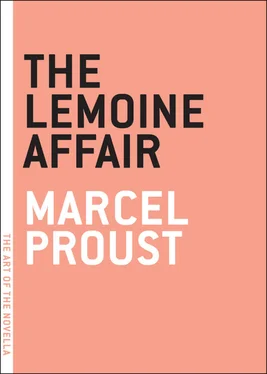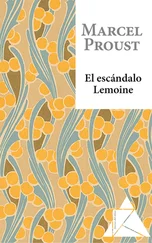So the black man takes an orange out of his pocket, and by doing so, he “wins esteem”! Mr. Flaubert, I understand, means that in a crowd someone who can put himself to use and who shows off some advantage, even an ordinary one familiar to everyone — someone who takes out a goblet, for example, when someone else is drinking out of a bottle next to him; or a newspaper, if he is the only one who thought to buy one — that this person is immediately singled out, noticed and pointed out by others. But confess that when it comes down to it you don’t mind, by risking this unusual and out of place expression of “winning esteem,” insinuating that all esteem, even the highest and most sought-after, is not much more than that, that it is made of envy inspired by possessions that are at bottom without any intrinsic value. Well, we say to Mr. Flaubert, that is not true; esteem — and we know that the example will touch you, since it is only in literature that you belong to the school of insensitivity, of impassivity —is acquired by a whole life devoted to science, to humanity. Literature, once upon a time, could procure it also, when it was only the gauge and so to speak the flower of the mind’s urbanity, of that entirely human disposition that can indeed have its predilections and its goals, but that allows, alongside images of vice and ridicule, those of innocence and virtue. Without going back to the ancients (who were much more “naturalist” than you will ever be, but who, on the painting we see in its material frame, always make a fully divine ray of light appear clearly, as if it were in the open air, which shines its light on the pediment and illumines the contrast), without going back to them, whether they go by the name of Homer or Moschus, Bion or Leonidas of Tarentum, not to mention more deliberate portrayals, tell us if you please, is this something different from what these same writers have always done, writers you do not fear to claim as your own? Saint-Simon above all, next to the atrocious and slanderous portraits of a Noailles or a Harlay, what great brushstrokes doesn’t he use to show us, in its light and its proportion, the virtue of a Montal, a Beauvilliers, a Rancé, a Chevreuse? And even in that “Human Comedy,” or the one so called, where Mr. de Balzac, with an almost mocking conceit, claims to outline “scenes” (actually entirely fabulous) “of Parisian and provincial life” (he, a man incapable of observation if ever there was one), compared with and almost making up for the Hulots, the Philippe Bridaus, the Balthazar Claes, as he calls them, and of whom your Narr’Havas and your Shahabarims have no reason to be envious, I admit, hasn’t he imagined an Adeline Hulot, a Blanche de Mortsauf, a Marguerite de Solis?
Indeed, it would have astonished, and rightly so, the Jacquemonts, the Darus, the Mérimées, the Ampères, all those men of delicacy and scholarship who knew him so well and who did not think there was any need, for such a trifle, to make so many bells ring out, if someone had told them that the witty Stendhal, to whom we owe so many clear and fruitful views, so many apposite remarks, would pass as a novelist in our day. But finally, he is even truer than you are! And there is more reality in the smallest study by — I’ll say Sénac or Meilhan, by Ramond or Althon Shée — than in yours, so laboriously inexact! — Don’t you yourself feel how wrong it is?
Finally the hearing is resumed (all that is quite stripped of detail and argumentation), Werner’s lawyer takes the stand, and Mr. Flaubert tells us that when he turns toward the magistrate he makes, each time, “such a profound bow that he was like a deacon leaving the altar.” That there were such lawyers, even at the Paris bar, “kneeling,” as the author says, before the court and the public prosecutor, is quite possible. But there are other kinds also — this, Mr. Flaubert does not want to know — and it wasn’t so long ago that we heard the estimable Chaix d’Est-Ange (whose published speeches have lost not indeed any of their impetus and wit, but only their forensic pertinence) proudly respond to a haughty summing-up by the public prosecutor: “Here, at the bar, the counsel for the prosecution and I are equal — except in talent!” That day, the amiable jurist who could not indeed find around him the atmosphere, the divine resonance of the last age of the Republic, could still, just like Cicero, shoot the golden arrow.
But action, held back for a while, is spurred and hastened on. The defendant is introduced, and at first, upon seeing him, some people seem to yearn (always more guesswork!) for the wealth that would have allowed them to leave for distant lands with a once beloved woman, and escape to those hours the poet speaks of, that alone are worthy of being lived and in which one becomes inflamed sometimes for one’s whole life, vita dignior oetas ! This piece, read out loud — although it lacks some of that feeling of sweet and authentic impressions, in which a Monselet, a Frédéric Soulié have indulged with much charm — seems adequately harmonious and vague: “They would have known the cry of petrels, the coming of the fog, the rocking of ships, the formation of clouds.” But, I ask you, what are petrels doing here? The author is again visibly starting to amuse himself — nay, we’ll use the word — to mystify us. We don’t need a degree in ornithology to know that the petrel is a very common bird on our shores, and that there is no need to invent the diamond and make a fortune just to meet one. A hunter who has often pursued it assures me that its cry has absolutely nothing special about it that could so strongly move someone hearing it. It is clear that the author had in mind only the felicity of the sentence. He decided the cry of the petrel would do the trick and so he quickly served it up to us. Mr. de Chateaubriand is the first person to have thus coaxed details added after the fact, and about whose truth he didn’t trouble much, to appear in a studied framework. But he, even in his slightest annotation, had the divine gift, the word that made the image appear life-sized, forever, in his insight and his description; he possessed, as Joubert said, the talisman of the Enchanter. O ye descendents of Atala, descendents of Atala, we find you everywhere today, even on anatomists’ dissection tables! Etc.
I do not like the diamond at all. I see no beauty in it. The little beauty it adds to that of human faces is less an effect of its own than a reflection of theirs. It has neither the ocean clarity of the emerald, nor the unbounded azure of the sapphire. I prefer the smoky glint of the topaz to it, and above all the twilight charm of opals. They are emblematic and twofold. If moonlight makes half of their face iridescent, the other seems tinged by the pink and green glints of sunset. We are not so much amused by the colors it presents to us, as we are touched by the dreams it conjures up. To one who can encounter nothing beyond himself except the form of his own fate, they show an alternative and taciturn face.
There were many of them in the city where Hermas took me. The house we lived in was valuable more from the beauty of the site than from the comfort of the beings in it. The perspective of horizons was more carefully managed there than the furnishing of the premises was planned. It was more pleasant to daydream there than it was to sleep. It was more picturesque than comfortable. Overwhelmed by the heat during the day, the peacocks made their fateful, mocking cries heard all night long — cries that are, to tell the truth, more suitable for daydreaming than favorable to sleep. The sound of the bells kept one from finding sleep during the morning, failing the sleep that one can only really enjoy before daylight — though the later sleep at least makes up to a certain extent for the fatigue from having been completely deprived of the earlier. The majesty of the ceremonies whose hours their chimes announced was a poor recompense for the annoyance of being awakened at an hour when one is supposed to be asleep, if one wishes to be able, later on, to profit from the ensuing hours. The sole recourse then was to quit the cloth of the sheets and the feather of the pillow and go walk through the house. This undertaking, to tell the truth, although it had some charm, also presented danger. It was amusing without ceasing to be perilous. One would rather give up the pleasure of it than pursue the adventure. The parquet tiles that M. de Séryeuse had brought back from the islands were many-colored and disjointed, slippery and geometric. Their mosaic was brilliant and erratic. The pattern of its lozenges, now red, now black, offered to the gaze a more pleasing spectacle than the wooden floor — raised here, broken there — promised the step a sure gait.
Читать дальше



![Marcel Proust - In Search of Lost Time [volumes 1 to 7]](/books/579170/marcel-proust-in-search-of-lost-time-volumes-1-to-thumb.webp)








